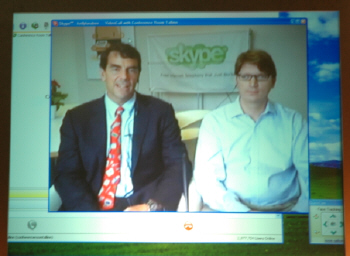Skype: A new, friendly communications monopoly?

The first morning session of the AO2005 Innovation Summit was a Skype video call (vSkype correction: vSkype is from a third-party user of Skype's API. The product used for the video call was a Skype internal alpha product that the company said will be the foundation for its video offering later this year) between host Tony Perkins and MarketWatch's Bambi Francisco in Palo Alto and Skype CEO Niklas Zennstrom and investor ($10 million in Skype) Tim Draper of Draper Fisher Jurvetson. Zennstrom declined to answer any questions about Yahoo trying to buy his company, annual revenue (said to be in the $6 to $10 million range, according to Bambi) and other financial matters or any other rumors. However, he did talk about Skype's business model and some of the company's strategies.
Skype's goal is to grow its user base and improve its products as fast as possible. In other words, get big super fast and prevent incumbent telecoms or other competitors (Yahoo, Google, Microsoft, etc.--any company with a big installed base) from impeding momemtum. Zennstrom said, "We are trying to create an ecosystem and our extend network...and we are focused on developing our products and extending our APIs so we can be bigger than we could be by ourselves."

Tim Draper (left) and Niklas Zennstrom via vSkype an alpha version of Skype's forthcoming video product
Besides opening its APIs so that developers can plug Skype into their blogs, Web sites, games or applications, Skype has developed an affiliate program that allows companies to co-brand the Skype service. So far, sites in China, Korea, Japan Taiwan and some European countries have co-branded the service, Zennstrom said. And, he is looking to make deals with smaller U.S. portals. Skype is also expanding the number of platforms it will support, such as Window Mobile Edition and Symbian. Zennstrom said that Palm was less of a priority because it isn't that great for real-time voice processing and that the user base is as big as other platforms.
In terms of the business model, Zennstrom said: "What is a great model for us is terrible for telecom companies." Skype can provide it basic service for free because its telecom service is in the software, and it doesn't require lot of capital expendutre or money to acquire cusotmers. "We get a lot of users because we allow them to communicate for free and then sell them value-added services, such as voicemail and Wi-Fi access, to a portion (1.7 million) of our users," Zennstrom said. "We want to decrease RPU (revenue per customer), because by doing it we get a lot of user paying and just a little money per users. That's very different than the telecoms."
Despite Skype's meager revenue to date, Draper wasn't shy--in fact, he was absolutely giddy during the interview--about characterizing Skype as the next huge thing, a backbone for a global, massive communications service. "We aren't replacing the telephone," Draper said, "we are creating a richer communications service." He went on to outline a bit of high tech history: "It took HP 40 years to become $1 billion in market cap; Microsoft, 15 years; Oracle, 9 years; Yahoo, 9 months; Skype about 3 weeks (I'm not exactly sure what that's based on). The cycles where companies go through S-curves are going faster and faster, and the market size is getting bigger and bigger--the world has opened up. We are seeing incredible value created in shorter and shorter time, and Skype is coming up in new curve and eclipsing Google, Yahoo and Microsoft. In another 20 years something will come along and eclipse Skype."
You would expect that kind of evangelism from Skype's savvy VC investor, but it's not all about valuations all the time as we saw when the bubble burst. That said, Skype could be your new friendly (no walled gardens), communications monopoly--based on having billions of users around the world connecting through Skype services. The company understands where the Web and communications is heading, and how to grow a market. Telecoms with try to block ports, buy or quash Skype, and competitors will try to duplicate Skype's model--which is all good for users. But Draper says he is holding out for at least a $1 billion offer for Skype before he'll give the acquisition path a thought--as least that what he said on this day...